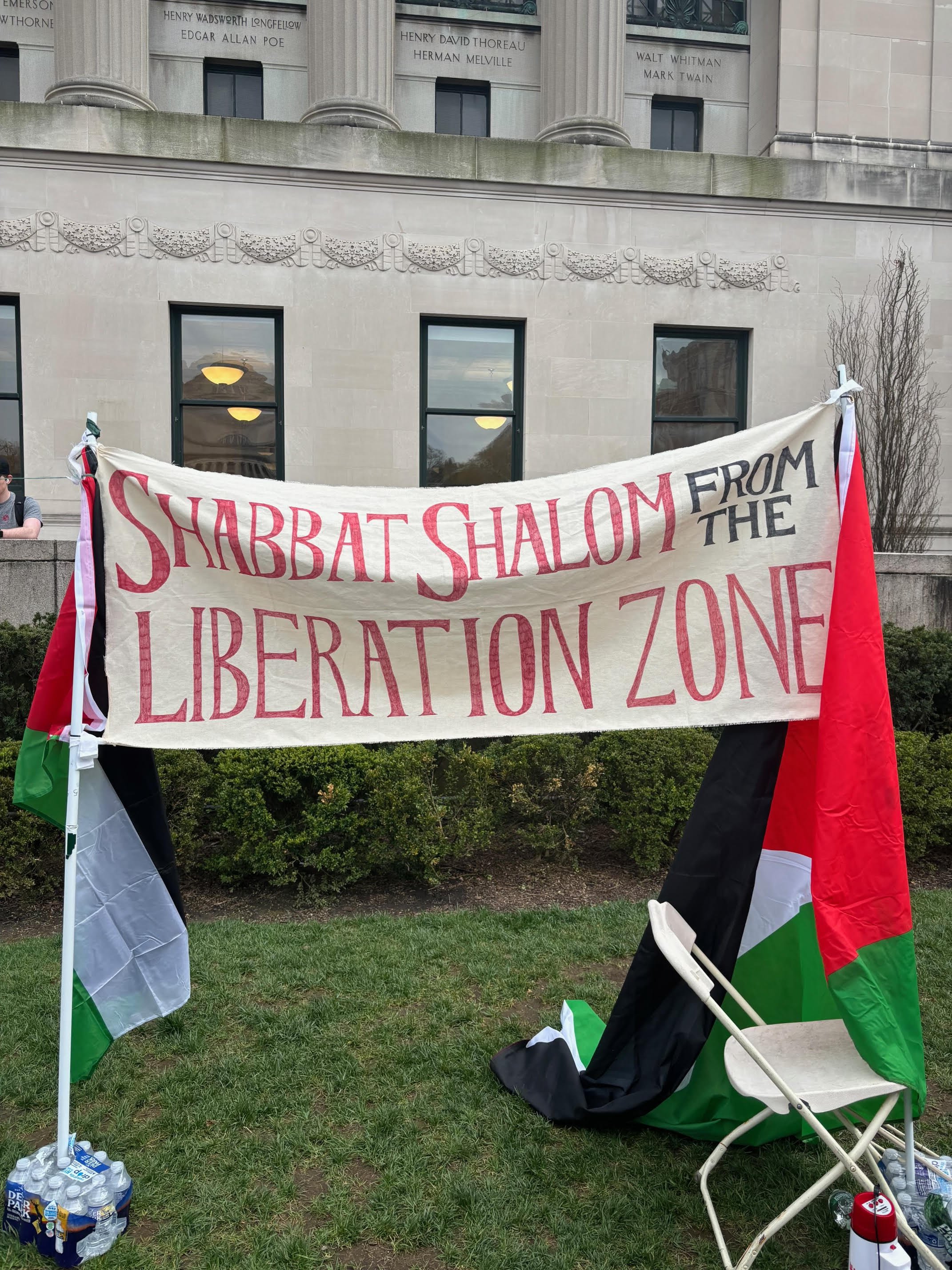Protesting Genocide: My Experience As A Jewish Student Fighting for a Free Palestine
(Photo/Author)
by Anonymous
This opinion was written by a protesting student while in the Columbia University Gaza Solidarity Encampment, expressing their views on the importance of standing in solidarity with Palestine as a Jewish student.
Every year during Hanukkah, my family and I light a Menorah that my ancestors brought to America as they fled the Holocaust. In Judaism, a Menorah symbolizes the miracle of light and light symbolizes the power of our interconnected identities. With nothing but the clothes on their backs and their Menorah in their hands, my ancestors came to New York with a dream for their children. We now have the liberties included in that dream: the right to protest.
I grew up with a traditional Jewish background. I attended Jewish preschool and Hebrew school. I am the legacy of those who have faced genocide and that will forever live within me. The meaning of “Tikkun Olam” is something that was drilled into me through my Jewish education. “Tikkun Olam” is a Hebrew phrase that translates to repairing the world. Believing in “Tikkun Olam” leads me to believe in a more just society. This inspires me to believe in a free Palestine.
For my anti-war advocacy on campus this school year, I have been ostracized by the Jewish community which is intended to be my safe space. I have been called names by my Jewish peers, have not been welcome at certain religious services, and have consistently had my Judaism discredited. There has been a creation of an us versus them mentality even within Judaism that vilifies certain members of the Columbia Jewish community. Despite the Zionist movement handpicking who they chose to include in their Judaism, I am a Jew. I am 0.2% of the world's population. Israel is my homeland as much as it is theirs.
I have been consistently at the Gaza Solidarity Encampment and am in awe of the Jewish inclusivity I have found in the space. Just this week, my friends made me a Passover Seder on the lawn in the encampment; none of them are Jewish, but they wanted me to have a way to celebrate the holiday. Last night, when there were neo-nazis (Proud boys among them) protesting on Broadway holding Israeli and American flags, my non-Jewish friends insisted that I shouldn’t walk alone and ensured I stayed safely on campus. Around 11 PM last night, when there were rumors and threats of another violent NYPD sweep of the encampment by the university, I called a family member and asked if it was safer to remain on the lawn where I would likely get arrested or walk home among right-wing extremists who are an open threat to people who look like me. They told me that I would be safer on the lawn.
The mischaracterization of the anti-war movement on college campuses has incredibly disheartened me. This is not to say that there is no antisemitism on college campuses. Antisemitism does exist on college campuses, and I have felt it at every level of my education thus far. The difference is that since the antisemitism I have constantly faced is not tied to the American Israel Public Affairs Committee’s (AIPAC) wallet, it is not legitimized. Throughout my lifetime, anytime I brought antisemitism to any school administrator’s attention, I was told that it was either a ‘lack of education’ or a ‘misunderstanding.’ As a Jewish student, I have been gaslit when I have faced antisemitism, and now I am being called an antisemite myself. As my community attempts to alienate me for their political gain, I have to constantly remind myself of my Jewish values and how they helped me to find a passion for the Palestinian cause.
Currently, the media misconstrues any form of opposition that could impact Israel’s financial interests as ‘antisemitism.’ The militarization and weaponization of antisemitism, in an attempt to police a newfound definition of the word itself, only makes students who look like me more vulnerable to antisemitism. As a Jewish student at Columbia, the attempt to turn our campus into a police state has made me feel less safe. Using Jewish safety as an excuse for turning a college campus into a military zone is a form of scapegoating that further isolates Jewish students from their peers. The unintended isolation Columbia’s Jewish community has faced is a direct result of administrative violence.
More than 34,000 Palestinians have been murdered at this point. A significant number of them are women and children. I am a low-income Jewish daughter of a single mother. All oppression is interconnected and structural harm chains us all. Fascism can no longer be used in our Jewish names. I have been very grateful for the space of the Gaza Solidarity Encampment for my Jewish peers and our allies to come together and stand up against genocide. Despite the deeply rooted Mccarthyism within the Columbia administration waging war on dissent, I have found safety on the lawn. This safety has not been created by zip-ties or helmets. It has been created through community and solidarity. If we do not have the right to protest against a genocide, then my ancestors did not achieve the liberties they dreamt of, as they carried our Menorah to America. That is my only fear.
As I sit here writing this on the notes app on my phone from a tent on the West Lawn, wondering if my friends and I will be safe through the night, that fear is all-encompassing. Despite that fear, I am somehow at peace experiencing the solidarity and community in this space. Being able to sit on a lawn at my university is a privilege, especially when all the universities in Gaza have been razed to the ground.
The author wished to remain anonymous.

